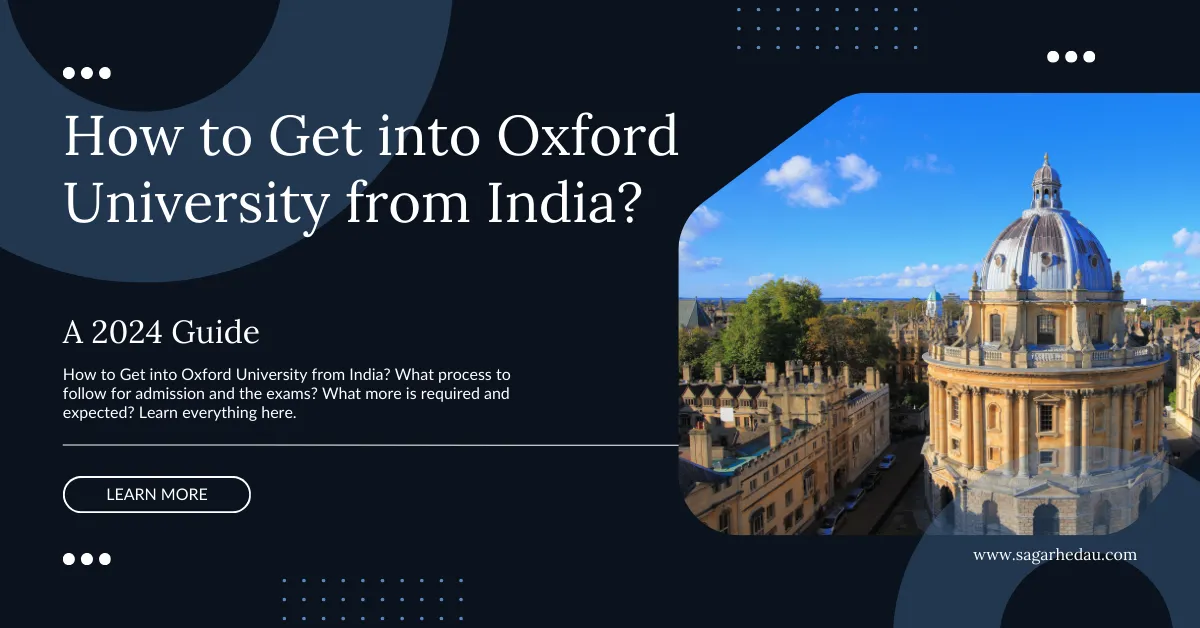Dreaming of studying at the prestigious University of Oxford? For many ambitious students in India, gaining admission to one of the world’s most renowned universities may seem like a distant goal. However, that dream can become a reality with the right guidance, preparation, and persistence. So how to get into Oxford University from India?
In this comprehensive 2024 guide, we’ll walk you through the essential steps—from choosing the right course to preparing for interviews—ensuring you’re well-equipped to navigate Oxford’s competitive application process. If you’re serious about joining the ranks of Oxford scholars, this guide will help set you on the right path!
Introduction: Why Oxford University?
Oxford University holds a prestigious position in global higher education, renowned for its rigorous academic standards and diverse range of courses.
- Historical Significance: Founded in 1096, it is one of the oldest universities in the world.
- Academic Excellence: Continuous top rankings in global university league tables.
- International Faculty: Encompasses scholars from various countries, ensuring a rich, diverse academic environment.
- State-of-the-Art Research Facilities: Pioneering research in multiple disciplines.
- Strong Alumni Network: Connecting students to influential leaders in various fields.
- Comprehensive Libraries: Some of the largest and most well-resourced libraries globally.
Understanding Oxford’s Admissions Criteria
Oxford University evaluates candidates based on several critical criteria.
Academic Excellence
- Grades: High grades in relevant subjects are essential.
- Standardised Tests: Achieving top scores in aptitude tests like the TSA, BMAT, or MAT, depending on the course, is crucial.
Interview Performance
Candidates undergo rigorous interviews aiming to assess:
- Critical Thinking: Ability to analyse and reason effectively.
- Subject Mastery: Depth of knowledge in the chosen field.
- Communication Skills: Clarity and coherence in articulating ideas.
Extracurricular Activities
Candidates should demonstrate:
- Engagement: Participation in relevant extracurricular activities.
- Achievements: Notable accomplishments in competitions or projects.
Personal Statement
A well-written personal statement reflecting:
- Passion: Genuine interest in the subject.
- Commitment: Dedication and enthusiasm for academic pursuits.
Researching Courses and Colleges
When considering courses and colleges at Oxford, potential students should:
- Identify Interests and Strengths:
- Evaluate academic strengths and personal interests.
- Match these with Oxford’s offered courses.
- Course Requirements:
- Examine the specific entry requirements for chosen courses.
- Review required subjects, grades, and standardised tests such as the BMAT or LNAT.
- College Selection:
- Understand the collegiate system and the differences between colleges.
- Visit the websites of individual colleges for specific details.
- Attend Webinars and Open Days:
- Participate in online webinars and virtual open days hosted by Oxford.
- Engage with faculty members and current students.
- Consult Rankings and Reviews:
- Check global and subject-specific rankings.
- Read alumni reviews and testimonials for insight into the academic environment.
Ensure all research aligns with personal and academic aspirations.
How to Get into Oxford University from India?
As an Indian candidate, what process do you need to follow to apply for Oxford University? We have covered all the factors in detail here. Do go through them carefully.
Meeting the Academic Requirements
Oxford University has stringent academic requirements for admission. Indian students need to demonstrate exceptional academic prowess, evidenced through their high school performance and standardised tests.
- High School Performance:
- A minimum of 90-95% in Class XII from recognised boards like CBSE, ICSE or IB.
- Consistency in academic records through Class X and XII.
- Entrance Exams:
- UCAS: Application through UCAS requires thorough preparation.
- Specific Tests: Many courses demand additional tests such as the BMAT for medicine, LNAT for law, etc.
- English Proficiency:
- Non-native speakers must show proficiency through IELTS or TOEFL.
- IELTS: Minimum score of 7.0 overall, with at least 6.5 in each component.
- TOEFL: 100 overall, with minimum scores in reading, listening, speaking, and writing.
Preparing for Standardised Tests: SAT, ACT, and Others
Oxford University typically requires applicants to have strong performance in standardised tests. For Indian students, the SAT or ACT are often necessary. Key preparation steps include:
- Understand the Test Format: Familiarise oneself with the test structure, timing, and question types.
- Practice Regularly: Use official practice tests and resources.
- Strengthen Vocabulary and Reading Skills: Regular reading of diverse materials is recommended.
- Mathematics Preparation: Focus on algebra, geometry, and advanced math topics.
- Seek Guidance: Consider enrolling in preparatory courses.
“Aim for scores in the top percentiles to be competitive.”
Crafting a Compelling Personal Statement
It is not only about qualifying and being eligible. the university asked for your genuine interest. For that, crafting a compelling personal statement is crucial for admission to Oxford University. Applicants should:
- Showcase Academic Interests: Elaborate on specific subject interests and past academic pursuits.
- Demonstrate Engagement: Highlight participation in related extracurricular activities or projects.
- Reflect Personal Qualities: Illustrate attributes like analytical thinking, curiosity, and resilience.
- Connect to Oxford: Articulate reasons for choosing Oxford and how its programmes align with future goals.
- Maintain Clarity: Ensure the statement is well-organised, concise, and free of grammatical errors.
- Seek Feedback: Review by mentors or professionals for refinement and coherence.
“A personal statement should provide insight into the applicant’s intellectual passion and clarity of purpose.”
Securing Strong Letters of Recommendation
Candidates must seek referees who are familiar with their academic and personal achievements. A well-written letter from reputable educators can significantly enhance an application.
- Identify Key Referees
- Select teachers, professors, or mentors who have closely worked with the applicant.
- Choose individuals who can provide detailed insights into academic performance and character.
- Provide Relevant Information
- Share a comprehensive resume or CV with referees.
- Include a list of achievements, extracurricular activities, and personal attributes.
- Request Early
- Contact referees well in advance to allow adequate time for drafting a thoughtful letter.
- Provide clear instructions regarding deadlines and submission processes.
Navigating the UCAS Application Process
Prospective students must embark on the UCAS journey meticulously. Key steps include:
- Research and Choose Programmes: Ensure alignment with academic and career goals.
- Create a UCAS Account: Visit the UCAS website and set up an account.
- Complete the Application Form: Provide personal details, education history, and employment information.
- Write a Personal Statement: Highlight achievements, motivations, and relevance to the chosen course.
- Gather References: Obtain academic or professional recommendations.
- Submit the Application: Ensure all sections are complete before submission, observing deadlines.
- Track Application Status: Monitor the progress and respond to offers through the UCAS Hub.
How to Get into Oxford University from India? Interview Process
Oxford’s interview process is intensive, demanding thorough preparation.
- Understand the Format: Research typical interview structures and familiarize yourself with common questions related to the chosen subject.
- Subject Knowledge: Deepen understanding of A-Level curriculum topics, as interviews often delve into advanced concepts.
- Mock Interviews: Participate in simulated interviews to acclimatize to the pressure and receive constructive feedback.
- Admissions Tutors: Read insights from Oxford’s admissions tutors to understand the qualities they seek.
- Critical Thinking: Develop problem-solving and analytical skills, often assessed through unconventional questions.
- Communication Skills: Practice articulating thoughts coherently and confidently.
“Interviews are designed to assess academic potential and enthusiasm for the subject.”
Visa and Immigration Advice for Indian Students
Indian students must secure a Tier 4 (General) Student Visa to study at Oxford University. Applicants must:
- Receive Confirmation of Acceptance for Studies (CAS) from Oxford.
- Prepare financial documents proving sufficient funds for tuition and living costs.
- Complete the online application form.
- Pay the visa fee and Immigration Health Surcharge (IHS).
- Provide biometric data at a Visa Application Centre.
- Submit a passport, CAS number, tuberculosis test results, and other required documents.
- Attend an interview, if requested.
Visa processing typically takes three weeks. Early application is advisable to avoid delays.
Financial Planning and Scholarships
Financial planning is crucial for Indian students aiming to study at Oxford University. Tuition fees, living costs, and other expenses can be significant.
- Estimate Costs:
- Tuition fees vary by course.
- Living expenses include accommodation, food, and travel.
- Scholarships and Grants:
- University-specific scholarships: Clarendon Fund, Rhodes Scholarship.
- External scholarships: Inlaks Scholarship, Commonwealth Scholarships.
- Student Loans:
- Government and private sector loans for international studies.
- Part-time Work:
- Explore work options available under the student visa policy.
Careful financial planning and exploring scholarship opportunities can alleviate the financial burden.
Living in Oxford: What to Expect
Living in Oxford offers a blend of historic charm and innovative culture. Students may reside in college-provided accommodation, often within walking distance of key facilities.
Cost of Living
- Accommodation: Ranges from £500 to £800 per month.
- Groceries: Approximately £150 to £200 per month.
- Transport: Minimal, as most locations are accessible by bike or on foot.
- Miscellaneous: Entertainment, dining out, and other personal expenses can vary.
Social Life
Oxford boasts a vibrant social scene, including:
- Student Societies: Over 400 options, from sports to arts.
- Cultural Activities: Museums, theatres, and historic tours.
- Events: Balls, formal dinners, and college events.
Academic Environment
The intense, intellectually stimulating atmosphere with:
- Libraries: Over 100 libraries are available to students.
- Support Systems: Academic advisors, counsellors, and peer networks.
Daily Life
Expect a mix of rigorous study sessions and enriching extracurricular experiences. Oxford fosters both academic excellence and personal growth.
Tips from Indian Students Who Made It
- Research Thoroughly: Conduct detailed research about the courses and faculty at Oxford. Know what aligns with their academic goals.
- Strong Personal Statement: Craft a compelling and unique personal statement, highlighting your passion for the chosen subject.
- Prepare for Admissions Tests: Dedicate ample time to prepare for Oxford’s specific entrance exams. Use past papers for practice.
- Seek Professional Guidance: Utilise mentorship from educators or consult professionals who have experience with the Oxford admission process.
- Stay Committed: Maintain consistent academic excellence and engage in extracurricular activities relevant to their field.
Wrapping Up: Final Preparations and Deadlines
Final preparations are essential for a successful application to Oxford University from India. Applicants must:
- Review all documents: Ensure accuracy and completeness.
- Prepare for the interview: Familiarise yourself with potential questions.
- Check admission deadlines: Adhere strictly to the timelines.
- Submit early: Avoid any last-minute technical issues.
- Complete visa requirements: Follow the UK visa application procedure diligently.
- Arrange finances: Ensure all funding and scholarships are confirmed.
Meeting these deadlines and being thoroughly prepared can greatly enhance an applicant’s prospects of securing admission to their desired programme.


